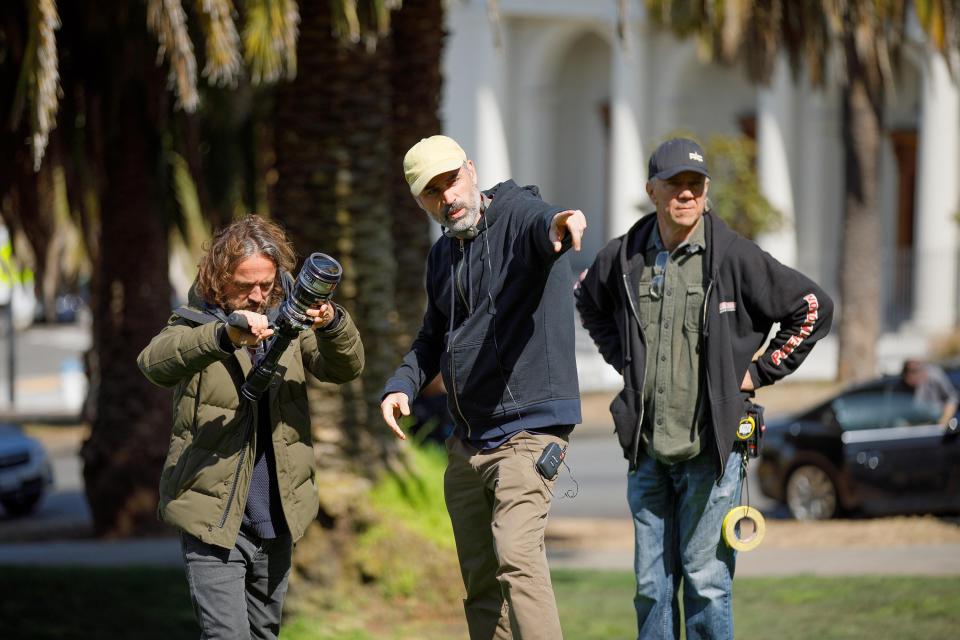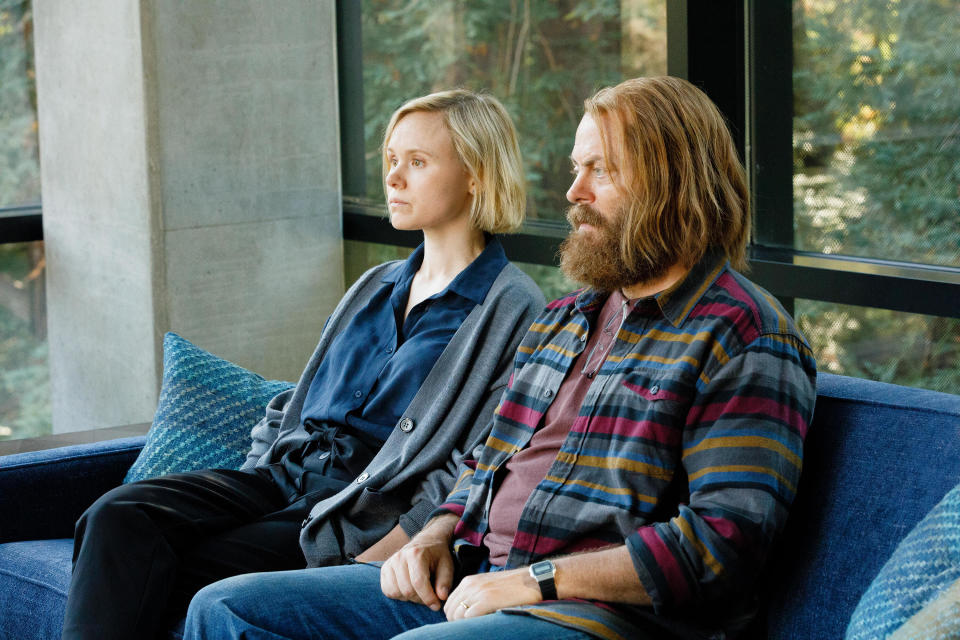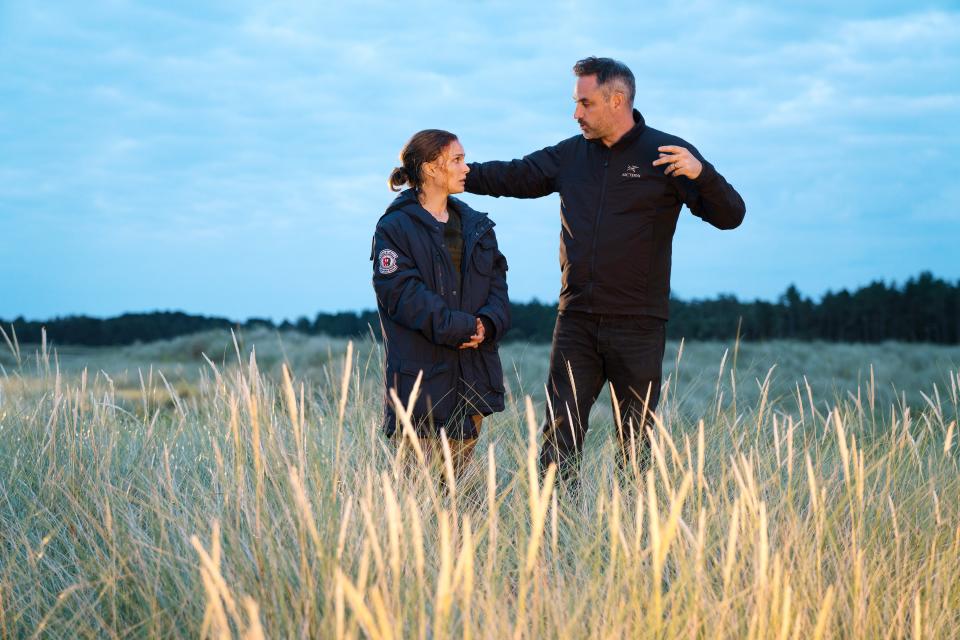Alex Garland Thinks You Have No Choice But to Read This Interview
Alex Garland was the last person I met before the world went into lockdown. The British writer/director of Hulu's unsettling new thriller Devs was in New York to scout locations for his still-under-wraps next project in early March, meeting with me in the basement library of his Midtown hotel. Twenty-four hours later, the World Health Organization would declare the coronavirus a pandemic, and the world as we knew it would start to slowly fall apart. Big things were happening, so I had big questions, mostly about whether or not free will is an illusion.
This is the central question of Devs, which is currently streaming exclusively via FX on Hulu. In the miniseries, a tech CEO named Forest (Nick Offerman) has built a quantum computer that may give him the power to peer into the future—an invention that raises the possibility that we may not control our fate. When this results in a murder, the implications get scarier, the science gets trickier, and by the end, you're left with a tangle of big, knotty thoughts that can leave you totally unmoored should you spend a significant amount of time thinking about them.
That's Alex Garland's signature move: Wrapping enormous ideas in genre thrillers that you can't look away from and letting those thoughts unsettle you long after the credits stop rolling, before ultimately, hopefully, enlightening you. His previous films, Ex Machina and Annihilation, are bold, striking stories about people in over their heads in the face of nightmares brought about by artificial intelligence and ecological disaster, respectively. With Devs, Garland's canvas is wider than ever, and he uses it to dive into a deeper range of ideas than ever before, including but not limited to: quantum physics, the villainy of tech companies, and the question of whether any of us has free will (he's skeptical).
GQ: So, how does one even get interested in quantum physics? Just, casually?
Alex Garland: Quantum physics is an attempt to really accurately describe the world we live in. The ideas contained within it are nuanced and provocative. They are an attempt to consider something fundamental and then produce these incredibly counterintuitive states. And that, to me, is just inherently interesting.
Does that factor into your worldview?
I'm particularly interested in science, and philosophy that flows directly from the implications of science rather than broader, more general sorts of philosophy—which are about, I don't know, the nature of what it is to be alive in more emotional terms. Generally speaking, I'm never really in any way offering up ideas that are mine. I'm saying something closer to: “Here are some amazing ideas that have been proposed by other people, and I'm gonna try to relay them via stories.”
In Devs, a lot of questions about differing interpretations of quantum physics come up, but there are very few concrete answers. Are you worried about viewers being frustrated?
One of the funny things about science is that people often think what science does is provide answers in a slightly cold and arrogant way. And I think science actually often has a lot of humility about it. And it doesn't say this is what's happening; it says this might be what's happening.
So why explore all this through a story like Devs?
I think the reason is just that I write stories, probably just by compulsion, and there's nothing more complicated about it. Stories are a good way of exploring these things, because explicitly lecturing on a particular position invites people to immediately say, "Well, I think this," and then listen to the rest of the lecture either in a position of agreement or a position of disagreement. Stories make those arguments more gently, and I like that more oblique way of approaching these ideas—via human experience.
Is that a tension you feel when you try to tell stories steeped in seemingly stodgy science? Devs is a head trip, but it's also about a woman trying to find out if her boyfriend was murdered.
Yeah, I guess it is. The thing that I get most interested in personally is ideas that are strongly counterintuitive yet appear to be true. In my early 20s, I read that time is not a constant, but it's affected by velocity. And that idea was so weird to me. I just immediately had to try and find out more about this idea of relativity and get as far as I could get.
Do you ever feel out of your depth?
I think that there's another part of this for me, which is that I'm a lay person and it doesn't matter how much I read or how hard I think: I always reach a brick wall, which is the limit of my own intellectual ability. Devs came a great deal from a book by a writer named David Deutsch, who's one of the people who first proposed the possibility of quantum computing. When I'm reading that book, I feel adrift in the best possible way, in the mind and thoughts of this particular person. And in some ways, all I'm really doing is saying, Hey, look at this guy. He's got some really interesting stuff to say.
I think my hope is that there's a lot of people out there who are already interested in this stuff, and then maybe those people enjoy Devs as a fun way of talking about those things. But I also hope that there are people out there who haven't encountered the idea that we really might not have free will, [or] that we're built of Lego bricks called quantum particles that exist in more than one space at the same time. [I hope] they find that idea weird and fascinating, and then read Deutsch or go on Wikipedia or watch PBS Space Time and open themselves up to these really beautiful ways of thinking.
Are you worried about audiences being resistant to stories that veer into the cerebral?
It's not really something I think about. I mean, my whole working life is demonstrated, in many respects, that I'm not able to speak to large groups of people. I work in and exist in a weird little subset of stories. Some people will definitely feel very oppositional; they'll think the stories are boring or pretentious or pointless. And I know that, but I just don't particularly care. I used the word compulsion earlier. I work out of compulsion. I don't sit down and plan something, and I definitely don't sit down and plan based on what the anticipated response would be. Otherwise, I would never end up writing a story about quantum mechanics.

You mentioned "the brick wall" of your own understanding before, how your understanding is much more limited than the people you are inspired by—and my own understanding is even more limited than that. How do you make sure these ideas survive the game of telephone?
Yeah, it's a problem. Climate change is a good example, where you have very loud, unsophisticated arguments being made holistically that drown out nuanced arguments. That is leading to a problem where there is a complete paralysis about what we actually do about it. I think one of the ways you can approach this stuff is just to do one's best to get one's head around it and try to hold on to the balloons of knowledge that are floating away from us because of these extraordinarily intelligent people, and try and keep them with us somehow.
In Devs, the characters build a machine where they can see any scene from history, and the first one we see is the crucifixion. Why Christ?
Because if you've got various moments in history you could choose to look at, given how influential the crucifixion turned out to be, it's a pretty good thing to look at. But [there are also] ideas that are playing out within the series: Some of them are just about people and the way they care about each other; there's also a discussion about theology.
There's also a huge issue embedded within a lot of religious systems where free will is concerned. On the one hand, you have a kind of divine architect who is required to be all-knowing and all-powerful. At the same time, those gods are often punishing us for our actions on earth. So the things we do dictate whether we have an afterlife that's a good one or a bad one. But if that god is all-knowing and all-powerful, presumably it knew before we did what we did that we were going to do it, because otherwise it wouldn't be all-knowing.
Devs, like Annihilation, contemplates spiritual ideas through science—there's what you said about Christ for one, and characters contemplate God more than once in Annihilation. Do you think science tends to veer toward the spiritual in your stories?
I don't think it does. I just think that what it does is provoke the same feeling that we think of as attached to spiritual thinking. Broadly speaking, it feels as if science and theology are at odds with each other—one of them is dry and prescriptive, and the other one concerns itself with what we call spiritual, which is like the wonder and magic of life. The mystery of it and the poetry of it. I think that religion very clearly expresses beautiful, poetic ways of thinking about the world and our place within it. And I think what I'm saying is not that religion doesn't do that—it definitely does do that—but science does it too. There's a form of poetry and wonder that comes via science just as it comes from religion. It's not either-or.

The actors you work with—like Nick Offerman in Devs—are very good at mirroring these ideas with performances that never veer into being all good or all bad. How does that tie into the story Devs is trying to tell?
I just think that's the way things are. Technology seems a good example of that. It's capable of really wonderful things, and it's capable of really destructive, terrible things. Once upon a time, 40 years ago, we might have defined that as a nuclear weapon. At this moment, we have issues with, for example, the spread of disinformation. I know that when I say something like that, it looks as if it's being directly aimed at people like my prime minister, Boris Johnson, or your president, Donald Trump, who in a provable way are both liars, and we can see quite clearly by photographic evidence what an inauguration crowd looked like compared to how it was presented.
But, actually, it extends well beyond those current leaders to a much more grassroots kind of disinformation. It's clearly problematic because the societies we're living in at the moment are so intolerant and divided and are preventing us from taking actions that we really ought to take.

Some of the clearest targets in Devs are the owners of technology companies—a recurring theme is how they have rules for how they use the power their products give them, and they break them all the time.
One thing I'd say is it's not just the power the technology companies and the leaders of the companies contain, it's also the power that we confer onto them. A lot of it is about the way we feel grateful for some of the arrivals of technology into our lives, and our gratitude to the people that present them.
One of the things I most admire about this country is that in its formation, it recognized a very significant problem with monarchies. And it's set up a system of checks and balances. And what we have in tech companies are organizations with a kind of power and wealth that is equivalent to nation-states and are run in a monarchistic way, and do not have the checks and balances of Congress and the Supreme Court, and even the free press because so much of what they do is kept behind closed doors. There's so much power, so much money. History suggests we should be careful.
It's a surreal time to be talking about this when there's a viral pandemic happening!
Oddly, I'm less worried about that than I am about something which is more polarizing, like climate change. The coronavirus is not really polarizing. No one wants to get it, and they know they don't want to get it. Climate change is something that some people don't believe exists.
As Devs goes on, all these things we're talking about come to the forefront, and the question of whether or not these characters have free will is brought to the forefront. So: Working on this, where's your thinking now? Do you think we have free will?
I don't want to suggest that I know, because I don't. But my instincts are leaning towards us not having free will. Partly because it feels like it would be quite easy to disprove, because if you found anything that happened in a completely spontaneous way, that wasn't the result of cause and effect, then you would have instantly disproved it and then free will could quite easily exist. But I can't see where those things exist. Chairs don't spontaneously come into existence. Planets don't spontaneously form. There is the result of conditions that began with a big bang.
I don't see where free will is supposed to be. I can't see where it's supposed to happen. We are physical objects that live in a physical universe. Our personalities are dictated partly by genetics and partly by environment. And we react according to those genetic and environmental factors and influences. So where is [free will]? I also think that unlike lots of areas of science—say, the relationship between time and velocity—it's more intuitive because it's so easy for us, once we choose to look at it, to see how people's environment and history affects their behavior later in life. I'm not bothered by that idea, but I do think it's interesting, and I also totally accept that I could be completely wrong.

You don't find it terrifying?
I don't think it's terrifying. I think it's compassionate. It relates to theological arguments within Devs about punishment, the way in which something all-knowing and all-powerful chooses to punish us or reward us based on our actions. I think that you can play that out in a much more prosaic way in prison sentences. If you were to say in a sort of deterministic sense that someone who commits a crime was acting in a predetermined way, that would then be a very strong argument against punishment and in favor of rehabilitation, which seems to me to be a compassionate position because it's a forgiving position.
You might then say there are some people who are too dangerous for society and cannot be rehabilitated, and therefore you exclude them from society. But with the broad scope of crime and punishment, most of the things that happen would be better treated by rehabilitation to try and stop someone from doing it again. So in other words: Changing their determined behavior rather than just punishing them, brutalizing them, and then spitting them back out into society.
There's partly that argument and there's also something else, which is: It doesn't matter whether you're in a predetermined state. You still care about things you care about—your loved ones, your family, your friends, your colleagues. You care about a beautiful landscape or beautiful flower. Lack of free will doesn't rob you of any of those things. So I don't see it as pessimistic. I see it as quite a kind, generous, or forgiving way of looking at the world.
This interview has been edited and condensed for clarity.
The final season of Delaney's uncompromising show Catastrophe put a period on a heavy few years for the actor. As he shows, comedy can't always be pretty—but it can be a start to something bigger.
Originally Appeared on GQ


